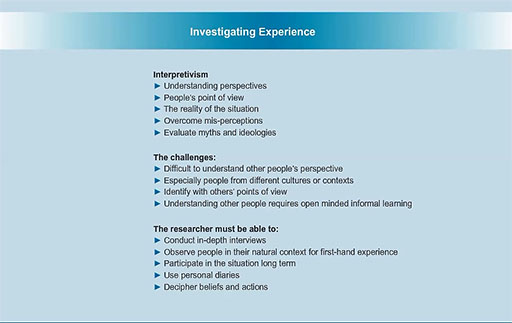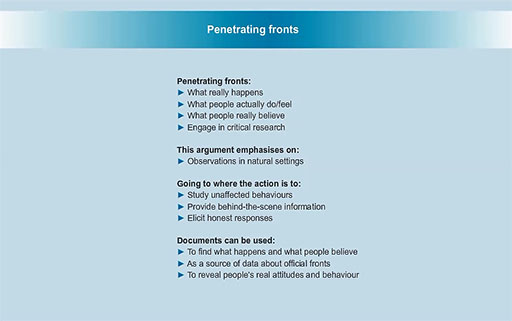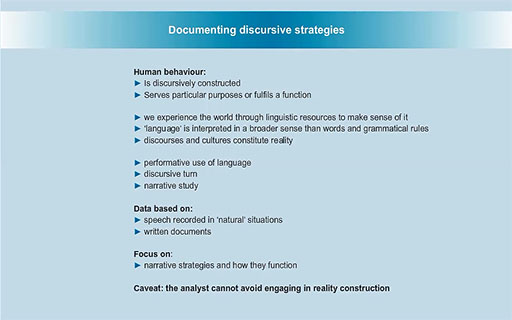2 Three broad approaches in qualitative research
The qualitative approach to research is focused on the subjective assessment of attitudes, opinions and behaviour. This approach generates results either in non-quantitative form or in a form which is not subjected to rigorous quantitative analysis. Techniques such as focus group interviews, projective techniques and in-depth interviews are generally used. Qualitative research requires greater clarity of goals during the design stages. In order to make sense of the considerable diversity, and even division, to be found within the field of qualitative research, we will sketch three broad approaches, each of which has shaped a great deal of qualitative work. We will call these approaches:
- investigating personal experience
- penetrating official fronts or conscious motives
- documenting discursive strategies.
While we will discuss them separately here, it should not be assumed that they are distinct in practice; in fact, researchers often combine them in various ways.
Activity 1
Watch the following videos and make notes on the basic characteristics of each qualitative research orientation.
Again, if you are finding the text in the videos too small to read, you can see the full text in the transcripts for each video.
Investigating Experience

Transcript
Add your notes here summarising the main arguments of this approach.
Penetrating fronts − Part 1

Transcript
Add your notes here summarising the main points of the above approach.
Penetrating fronts − Part 2
There are reasons why, from the point of view of this second approach, interviews may not give us access to the data we require. Can you think of any? Write down your thoughts and then compare with the feedback provided.
Discussion
First, and most obviously, people will not necessarily tell us the truth in interviews about how they feel, what they think, or what they do.
Second, they may not know these things. One reason for this is that, as indicated earlier, much of our everyday behaviour is below the level of consciousness, we are not aware of key aspects of it, because we do not have to concentrate on these in order to carry it out. There are also some arguments to the effect that many aspects of our feelings and behaviour are obscured from us by psychodynamic processes, that these prevent us from recognising important facts about ourselves because doing so would be painful. These processes may be particularly powerful where we are asking people to describe their past lives, or events in the past, since we know that memory is selective and reconstructs our experience rather than simply re-presenting it. Furthermore, where informants provide accounts of other people’s behaviour, these are likely to be filtered through pragmatic concerns that will only take account of a small part of what those other people do or feel, and which may well be very crude or even inaccurate representations of their attitudes, beliefs, and behaviour.
Third, people may not be aware of the remoter causes or consequences of what they do. It is sometimes argued that only a researcher who places someone’s behaviour within a broader context, in both historical and social terms, will be able to reveal these. Moreover, many arguments about human social behaviour link remote causes and consequences in functional relationships: it is argued that particular social practices become established because of the consequences they typically have, these feeding back to reinforce the practices they serve. The people involved in such functional social processes may not be aware of them. For example, patterns of social inequality may be reproduced in this way.
Finally, those adopting a constructionist orientation would point out that the accounts that informants provide in interviews are produced to serve particular discursive functions in the course of the interview, that they reflect the role of the interviewer (what questions were asked, how, and so on), and the particular way in which the interview developed as an interactional situation. From this they often draw the conclusion that to expect that interview accounts could ever represent some independent reality existing beyond the interview situation is an illusion.
All of these considerations can lead to scepticism about the accounts people provide in interviews; though in our view they by no means rule out the use of interviews entirely.
Documenting Discursive Strategies

Transcript
Add your notes here summarising the main arguments of the third approach.
